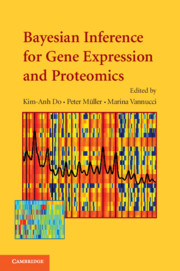Book contents
- Frontmatter
- Contents
- List of Contributors
- Preface
- 1 An Introduction to High-Throughput Bioinformatics Data
- 2 Hierarchical Mixture Models for Expression Profiles
- 3 Bayesian Hierarchical Models for Inference in Microarray Data
- 4 Bayesian Process-Based Modeling of Two-Channel Microarray Experiments: Estimating Absolute mRNA Concentrations
- 5 Identification of Biomarkers in Classification and Clustering of High-Throughput Data
- 6 Modeling Nonlinear Gene Interactions Using Bayesian MARS
- 7 Models for Probability of Under- and Overexpression: The POE Scale
- 8 Sparse Statistical Modelling in Gene Expression Genomics
- 9 Bayesian Analysis of Cell Cycle Gene Expression Data
- 10 Model-Based Clustering for Expression Data via a Dirichlet Process Mixture Model
- 11 Interval Mapping for Expression Quantitative Trait Loci
- 12 Bayesian Mixture Models for Gene Expression and Protein Profiles
- 13 Shrinkage Estimation for SAGE Data Using a Mixture Dirichlet Prior
- 14 Analysis of Mass Spectrometry Data Using Bayesian Wavelet-Based Functional Mixed Models
- 15 Nonparametric Models for Proteomic Peak Identification and Quantification
- 16 Bayesian Modeling and Inference for Sequence Motif Discovery
- 17 Identification of DNA Regulatory Motifs and Regulators by Integrating Gene Expression and Sequence Data
- 18 A Misclassification Model for Inferring Transcriptional Regulatory Networks
- 19 Estimating Cellular Signaling from Transcription Data
- 20 Computational Methods for Learning Bayesian Networks from High-Throughput Biological Data
- 21 Bayesian Networks and Informative Priors: Transcriptional Regulatory Network Models
- 22 Sample Size Choice for Microarray Experiments
- Plate section
14 - Analysis of Mass Spectrometry Data Using Bayesian Wavelet-Based Functional Mixed Models
Published online by Cambridge University Press: 23 November 2009
- Frontmatter
- Contents
- List of Contributors
- Preface
- 1 An Introduction to High-Throughput Bioinformatics Data
- 2 Hierarchical Mixture Models for Expression Profiles
- 3 Bayesian Hierarchical Models for Inference in Microarray Data
- 4 Bayesian Process-Based Modeling of Two-Channel Microarray Experiments: Estimating Absolute mRNA Concentrations
- 5 Identification of Biomarkers in Classification and Clustering of High-Throughput Data
- 6 Modeling Nonlinear Gene Interactions Using Bayesian MARS
- 7 Models for Probability of Under- and Overexpression: The POE Scale
- 8 Sparse Statistical Modelling in Gene Expression Genomics
- 9 Bayesian Analysis of Cell Cycle Gene Expression Data
- 10 Model-Based Clustering for Expression Data via a Dirichlet Process Mixture Model
- 11 Interval Mapping for Expression Quantitative Trait Loci
- 12 Bayesian Mixture Models for Gene Expression and Protein Profiles
- 13 Shrinkage Estimation for SAGE Data Using a Mixture Dirichlet Prior
- 14 Analysis of Mass Spectrometry Data Using Bayesian Wavelet-Based Functional Mixed Models
- 15 Nonparametric Models for Proteomic Peak Identification and Quantification
- 16 Bayesian Modeling and Inference for Sequence Motif Discovery
- 17 Identification of DNA Regulatory Motifs and Regulators by Integrating Gene Expression and Sequence Data
- 18 A Misclassification Model for Inferring Transcriptional Regulatory Networks
- 19 Estimating Cellular Signaling from Transcription Data
- 20 Computational Methods for Learning Bayesian Networks from High-Throughput Biological Data
- 21 Bayesian Networks and Informative Priors: Transcriptional Regulatory Network Models
- 22 Sample Size Choice for Microarray Experiments
- Plate section
Summary
Abstract
In this chapter, we demonstrate how to analyze MALDI-TOF/SELDI-TOF mass spectrometry data using the wavelet-based functional mixed model introduced by J. S. Morris and R. J. Carroll (wavelet-based functional mixed models. Journal of the Royal Statistical Society, Series B, in 2006, which generalizes the linear mixed model to the case of functional data. This approach models each spectrum as a function, and is very general, accommodating a broad class of experimental designs and allowing one to model nonparametric functional effects for various factors, which can be conditions of interest (e.g., cancer/normal) or experimental factors (blocking factors). Inference on these functional effects allows us to identify protein peaks related to various outcomes of interest, including dichotomous outcomes, categorical outcomes, continuous outcomes, and any interactions among factors. Functional random effects make it possible to account for correlation between spectra from the same individual or block in a flexible manner. After fitting this model using Markov chain Monte Carlo, the output can be used to perform peak detection and identify the peaks that are related to factors of interest, while automatically adjusting for nonlinear block effects that are characteristic of these data. We apply this method to mass spectrometry data from a University of Texas M.D. Anderson Cancer Center experiment studying the serum proteome of mice injected with one of two cell lines in one of two organs. This methodology appears promising for the analysis of mass spectrometry proteomics data, and may have application for other types of proteomics data as well.
Introduction
MALDI-TOF is a mass-spectrometry-based proteomics method that yields spiky functional data, with peaks corresponding to proteins present in the biological sample.
- Type
- Chapter
- Information
- Bayesian Inference for Gene Expression and Proteomics , pp. 269 - 292Publisher: Cambridge University PressPrint publication year: 2006
- 8
- Cited by



